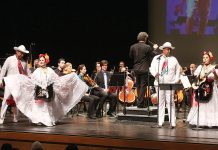SANTA CRUZ COUNTY—Just as he did with the 2016 presidential election, President Donald Trump is making accusations of a rigged and fraudulent election in 2020.
But how easy is it to “steal” an election?
Ask Santa Cruz County Clerk Gail Pellerin. She’s been the head of the Elections Office since 1993, and has dealt with mountains of ballots safely being tallied.
“Where is the evidence? That’s the main question,” Pellerin said. “If you believe something is not done in accordance to the law and is in violation—where is the proof? What can you point to to say this did not go well?”
Pellerin said that in her experience, stolen or fraudulent votes are extremely rare.
“While we have not finished yet, there is the possibility that one person voted here but had a prior registration in another county and also voted there,” she said. “We’re researching this. It’s not like this huge number of hundreds of people… In the 27 years that I have been doing this job, we’ve only had one case of a local person who got the ballot of their tenant and voted it and turned it in and we caught it in our signature verification process.”
Pellerin added that the Elections Office has the proper system of checks and balances to ensure that the right people are getting the ballots and returning them for accurate counting.
“The reality is, if you’re going to commit voter fraud and you’re doing it one voter at a time, that is going to be very difficult to impact the outcome of the elections,” Pellerin said. “The easier way to impact an election is to suppress the vote, to put lies and deceit out on social media that people may or may not believe.”
Pellerin added that a Boulder Creek woman actually claimed that her dog voted, but once that ballot came before the scrutiny of the Elections Office it was discounted. The woman reportedly used the last four digits of the dog’s implanted microchip number to register, just as a person uses the last four digits of their Social Security number for such purposes.
“This is our community,” she said. “We have voting locations made up of people of different races, genders, different political parties—we’re all there working together because we care passionately about making sure people have access to voting.
“We could not live with ourselves if we did not conduct the election ethically, honestly, transparently, maturely and securely, and I believe this is the case for every local elections official in this country.”
Human error does occasionally occur, Pellerin said. But not in huge numbers.
“Our proof is in the ballots,” she said. “It’s a pretty simple formula and the accuracy and the transparency is so complete for me. I just don’t get it when people go off on these tangents. If we have proof of anything wrong, it needs to be investigated. This president claims voter fraud when he wins and he claims fraud when he loses. But right now I think what we have is a sore loser.”











